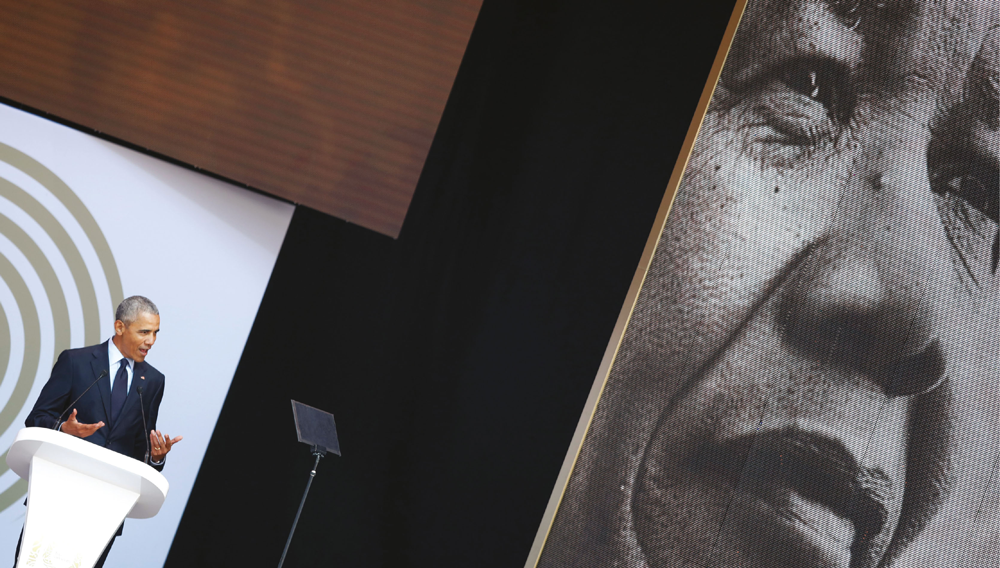YEAR OF MANDELA
PRISONER OF PEACE
Rajika Jayatilake reflects on the inspiring legacy of the late great former South African leader
Among the millions who scurry about feverishly enriching their material lives, there are those rare and unselfish people who speak out for the greater good. And they’re remembered long after their voices are stilled.
A hundred years after the birth of post-apartheid South Africa’s first black president Nelson Mandela and five years post his death, the world pauses to reflect on the man’s legacy, his principles and leadership style. After all, 2018 has been earmarked as the ‘Year of Mandela.’ As his wife Graça Machel noted, Mandela “represented how you exercise power without losing yourself in that power.”
Former US President Barack Obama delivered the 16th Nelson Mandela Annual Lecture in Johannesburg and remarked: “In prison, he studied Afrikaans so that he could better understand the people who were jailing him. And when he got out of prison, he extended a hand to those who had jailed him because he knew that they had to be a part of the democratic South Africa that he wanted to build.”
Mandela once wrote that “if you want to make peace with your enemy, you have to work with your enemy. Then he becomes your partner.”
UN Secretary-General António Guterres describes Mandela as “a towering advocate for equality and justice.” He adds: “Nelson Mandela was held captive for many years. But he never became a prisoner of his past. Rarely has one person in history done so much to stir people’s dreams and move them to action.”
Mandela was a human rights lawyer who sacrificed 27 precious years of his life in prison for leading the antiapartheid African National Congress (ANC). The ANC was charged with attempting to topple the government. Commenting on his thoughts upon being released, Mandela said: “As I walked out of the door towards the gate that would lead to my freedom, I knew if I didn’t leave my bitterness and hatred behind, I’d still be in prison.”
His consistent call was to ‘make the world a better place.’ He had experienced the sharp blows of discrimination, having been born in a country that deemed him a second-class citizen. Mandela studied and became a lawyer because he believed that “education is the most powerful weapon, which you can use to change the world.”
Mandela also believed that “the true character of society is revealed in how it treats its children.” Currently, the Nelson Mandela Children’s Fund, a rights based movement, is focussed on giving “voice and dignity to the African child.”
In 2009, Mandela and Graça Machel were jointly voted the Decade Child Rights Heroes for their tireless efforts to create a better future for the children of South Africa, and the world. When he won the Nobel Peace Prize in 1993, Mandela allocated s part of his prize money to support needy children. As Bruce Lee’s son the late Brandon Lee once said: “Immortality is to live your life doing good things and leaving your mark behind.”
Mandela spent 67 years of his life struggling valiantly to create a better world. In his later years, he engaged with the people of the planet as an international peacemaker.
During his presidency, Mandela tirelessly attempted to resolve the longstanding conflicts in Africa and introduce peace through democracy. His support for the International Criminal Court (ICC) resulted in South Africa becoming one of its first 10 signatories on 17 July 1998.
He said: “We have sought to ensure that the ICC is guaranteed independence and bestowed with adequate powers. Our own continent has suffered enough horrors emanating from the inhumanity of human beings towards human beings. Who knows, many of these might not have occurred or at least been minimised had there been an effectively functioning International Criminal Court.”
By establishing the ICC, the UN certified the idea that individual lives have a higher value than national sovereignty and all nations must be held accountable to the rule of law when mass atrocities occur. Upon Mandela’s passing in 2013, the ICC observed: “Though the world has lost one of its greatest architects of justice, freedom and equality, his legacy remains profound and lasting.”
In November 2009, the UN General Assembly declared 18 July as Nelson Mandela International Day in honour of the iconic leader’s contribution to furthering peace and freedom in the world.
It’s a matter of regret that countries around the world are unable to follow his example of universal love, compassion, compromise and forgiveness, on issues of peace and reconciliation. Nations that are emerging from years of fear and bloodshed, and from the shackles of terrorism, could benefit greatly by emulating Mandela’s values and perspectives.
During his lecture, Obama repeated one of Mandela’s famed and oft repeated quotes: “People must learn to hate and if they can learn to hate, they can be taught to love, for love comes more naturally to the human heart.”




